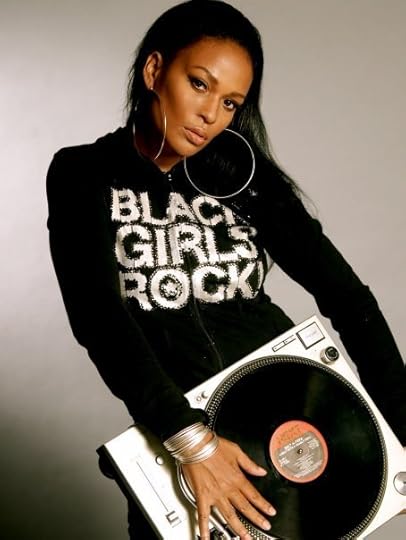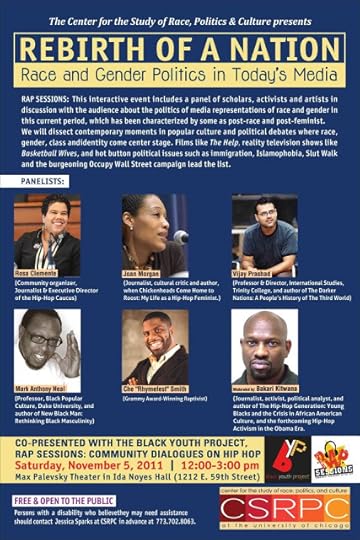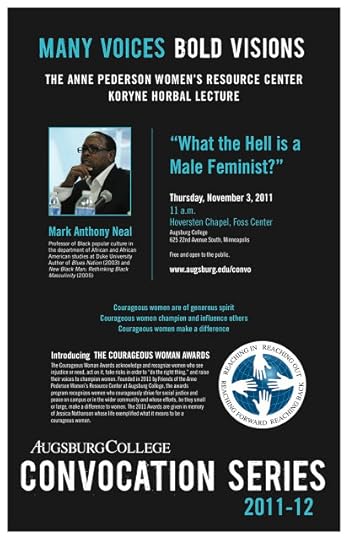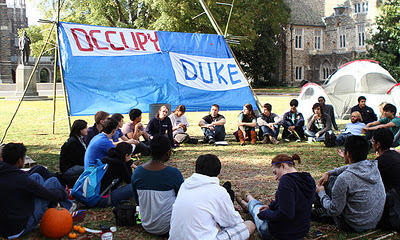Mark Anthony Neal's Blog, page 1048
November 2, 2011
Beverly Bond Discusses 'Black Girls Rock' on Michael Eric Dyson Show
 DJ Beverly Bond Speaks About her Program "Black Girls Rock"November 2, 2011 |
The Michael Eric Dyson Show
DJ Beverly Bond Speaks About her Program "Black Girls Rock"November 2, 2011 |
The Michael Eric Dyson Show
If it's true that "last night a DJ saved my life," then it seems that DJ Beverly Bond is on a mission to save the images of Black girls and women through her program, Black Girls Rock! She is the founder, CEO and executive producer of the program, which is dedicated to empowering women of color across the globe and counter the negative images of how women, especially Black women, were being portrayed in the media. Black Girls Rock will take the stage this Sunday, Nov. 6 on with its second annual awards show and special on BET.[image error]Listen Now: Beverly Bond
Published on November 02, 2011 21:02
Fort Monore Designated National Monument #BlackFreedom
President Obama Designates Fort Monroe A National Monument, Historic For Role In Slavery by Trymaine Lee | HuffPost BlackVoices
President Barack Obama signed a proclamation this morning designating Fort Monroe a national monument. The recently decommissioned Army fort in Virginia played a central role in the Civil War and the nation's slave trade.
It was there, in the summer of 1619, on a swath of land surrounded by a moat in Virginia's Tidewater region, that Dutch traders brought the first enslaved Africans to the fledgling colony. Later, during the Civil War, the fort was controlled by the Union and became a haven and refuge for escaped slaves."This is one of the most important and powerful historic places in America, the spot where slavery began and also, two and a half centuries later, received its deathblow," Adam Goodheart, author of "1861: The Civil War Awakening," said to The Huffington Post. "It is the Plymouth Rock of African-American culture. I am thrilled it will be preserved and honored."
The designation marks the president's first use of his authority under the Antiquities Act, first used by President Theodore Roosevelt in 1906 to establish America's first national monument, Devil's Tower in Wyoming.
The president's designation was about more than just protecting the fort and the land upon which it sits. According to the White House, continued preservation efforts could bring as many as 3,000 jobs to the region.
"Fort Monroe has played a part in some of the darkest and some of the most heroic moments in American history," President Obama said in a statement. "But today isn't just about preserving a national landmark -- it's about helping to create jobs and grow the local economy. Steps like these won't replace the bold action we need from Congress to get our economy moving and strengthen middle-class families, but they will make a difference."
National parks are responsible for $13.3 billion of local, private-sector economic activity nationwide, supporting 267,000 private-sector jobs, according to a statement released by the White House. There are currently 21 national park units located in Virginia; Fort Monroe would be the 22nd in the state and the 396th nationwide. The statement also said a 2009 study by the National Parks and Conservation Association found that each federal dollar invested in national parks generates at least four dollars of economic value to the public.
Authors and historians have cited Fort Monroe as not only where the earliest slaves arrived, but as having also played a role in the ending of the institution. The fort was also where Confederate President Jefferson Davis was imprisoned after the Civil War.
In an article in the New York Times published earlier this year, entitled "How Slavery Really Ended In America," Goodheart wrote that on May 23, 1861, little more than a month into the Civil War, "three young black men rowed across the James River in Virginia and claimed asylum in a Union-held citadel, Fort Monroe, Va., a fishhook-shaped spit of land near the mouth of the Chesapeake Bay."
And in doing so, "not amid the thunder of guns and the clash of fleets, but stealthily, under cover of darkness, in a stolen boat," pushed their way into history and to freedom. Army commanders at the fort used the information given to them by the three men, who had been working at nearby Confederate encampment, to their advantage.
That same year, General Benjamin Butler, the commanding officer at Fort Monroe, signed the "Contraband Decision," which provided a pathway to freedom for thousands of enslaved people during the Civil War and served as a forerunner to President Abraham Lincoln's Emancipation Proclamation of 1863.
Published on November 02, 2011 09:30
November 1, 2011
Rebirth of a Nation: Race & Gender Politics in Media | University of Chicago
 Rebirth of a Nation: Race & Gender Politics in Media
Rebirth of a Nation: Race & Gender Politics in MediaSaturday, November 5, 2011 12:00 pm
IdaNoyes Hall, Max Palevsky Cinema1212 East 59th Street, Chicago, IL
This interactive event includes a panel of scholars,activists and artists in discussion with the audience about the politics ofmedia representations of race and gender in this current period, which has beencharacterized by some as post-race and post-feminist. We will dissectcontemporary moments in popular culture and political debates where race,gender, class and identity come center stage. Films like The Help, realitytelevision shows like Basketball Wives, and hot button political issues such asimmigration, Islamophobia, and the burgeoning Occupy Wall Street campaign leadthe list. Panelists: Rosa Clemente, Bakari Kitwana (moderator), Joan Morgan, Mark Anthony Neal, VijayPrashad, and Che"Rhymefest" Smith.
Co-presented with the Black Youth Project; the Organization of Black Studentsat U of C; and Rap Sessions: Community Dialogues on Hip Hop Website
Contact: Center for the Study of Race, Politics and Culture (CSRPC)773-702-8063
Published on November 01, 2011 19:52
Is Occupy Wall Street Lacking Diversity? James Braxton Peterson Responds
Lehigh University professor James Braxton Peterson looks at claims that the Occupy Wall Street protestors lack diversity.
Published on November 01, 2011 19:31
Horbal Lecture @ Augsburg College (MN) features Professor Mark Anthony Neal | #AwardTour

Horbal Lecture @ Augsburg College features Professor MarkAnthony Neal
The 2011 Anne Pederson Women's Resource Center Koryne Horballecture features Duke Universityprofessor and author Mark Anthony Nealspeaking on the topic: "What theHell is a Male Feminist?" The lecture is Thursday, November 3, at 11a.m. in the Hoversten chapel.
Mark AnthonyNeal is a professor of Black popular culture in the department of African andAfrican American studies at Duke University, author of Blues Nation (2003) and NewBlack Man: Rethinking Black Masculinity (2005). Neal is engaged ininterdisciplinary scholarly work in the fields of African-American, cultural,and gender studies that draws upon modes of inquiry informed by the fields ofliterary theory, urban sociology, social history, postmodern philosophy, Queertheory and most notably popular culture. His broad project is to interrogatepopular culture—music, television, film, and literature—produced within thecontext of Afro-diasporic expressive cultures. It is his belief that popularculture represents an arena of knowledge that has a profound impact on societaland cultural norms in the United States and globally, but one that has beenlargely underscrutinized as a "serious" site of scholarly andtheoretical study. He also believes that commercial popular culture representsa distinct site of ideological production; thus, his work aims to engage theideological undercurrents within commercial popular culture particularly withinthe context of race, gender, sexuality, class, and ethnicity.
Introducing the Courageous Woman Awards
At the convocation, the Women's Resource Center will present the first CourageousWoman Awards. These awards acknowledge and recognize women who seeinjustice or need, act on it, take risks in order to "do the rightthing," and raise their voices to champion women. Founded in 2011 byFriends of the Anne Pederson Women's Resource Center at Augsburg College, theawards program recognizes women who courageously strive for social justice andpeace on campus or in the wider community and whose efforts, be they small orlarge, make a difference to women. The 2011 awards are given in memory ofJessica Nathanson whose life exemplified what it means to be a courageous woman.
Published on November 01, 2011 07:39
October 31, 2011
'Left of Black' S2:E8 w/ E. Patrick Johnson and Honoreé Fanonne Jeffers
Left of Black S2:E8w/E. Patrick Johnson and Honoreé Fanonne Jeffers October31, 2011
Host and Duke UniversityProfessor Mark Anthony Neal isjoined via Skype© by E. Patrick Johnson , author of SweetTea: Black Gay Men of the South; an Oral History. A Professor ofPerformance Studies at NorthwesternUniversity, Johnson's ethnographic work on this book evolved into a playcalled Pouring Tea: Black Gay Men of theSouth Tell Their Tales. Johnson shares his motivation to turn hisbook into a play, and also discusses how his journey through these projectshelped him better come to terms with his own personal issues. He shareshis reactions to the different responses he's gotten so far from to the stageperformance. Johnson, whose play premiered in Chicago's About Face Theaterand was recently staged at The Signature Theater in Arlington Virginia, alsodiscusses the significance of the title. Later Neal is joined by Honoreé Fannone Jeffers , poet, commentator, satirist, blogger andprofessor of English at the Universityof Oklahoma. Jeffers, author of several collections of poetryincluding The Gospel of Barbecue and Red Clay Suite, discusses her blog PhillisRemastered and her work-in-progress on the 18th century poet PhillisWheatley. In a wide ranging conversation, Neal and Jeffers also discussthe legacy of Aishah Shahidah Simmons' groundbreaking film NO! The RapeDocumentary, the Slut Walk protest& the concept of Post-Black.
***
Left ofBlack is a weekly Webcast hosted byMark Anthony Neal and produced in collaboration with the John Hope FranklinCenter at Duke University.
***
Episodesof Left of Black are also available for download @ iTunes U
Published on October 31, 2011 17:06
October 30, 2011
Amber Cole is My Daughter
[image error]
Amber Cole is My Daughterby Mark Anthony Neal | NewBlackMan
Iwas too busy raising my two daughters, aged thirteen and eight, to pay muchattention to Amber Cole, but the truth is that Amber Cole is my daughter andthe daughter of so many of us.
UnlikeJimi Izrael's recent suggestion, I have not seen the so-called Amber Colevideo. That so many have—and inthe process downloaded and trafficked in illegal child pornography—speaksvolumes about how we, as a society, think about Black girls. For that reasonalone, Amber Cole is my daughter.
Isuspect that for far too many, who have voiced displeasure and alarm aboutAmber Cole, and or the parenting skills of the adults responsible for her, itis less about real concern for Cole and more likely about the collective shamethat she evokes. Unfortunately itis such shame, and the politics of respectability that go hand-in-hand withBlack collective shame, that often keeps us from having honest discussions aboutsex and sexuality in our communities—often to the detriment of our children.
Ironically,this shame is seemingly always directed towards the women and girls in ourcommunities and rarely extended to the men and boys who are complicit in sexacts. It goes without saying, thatin the case of Amber Cole, such complicity is indeed criminal; under the law, a14-year-old cannot consent to sex acts. Too often our conversations with our boys is not to discourage underagesex acts—indeed such acts viewed as a rite of passage for boys—but rather, tocaution them about impregnating a partner, whether she consents or not. Few have mentioned rape in response tothis case, the reality of the act over-shadowed by the resentment and ire thatAmber Cole has drawn from many.
Assuch there are some who will claim that Amber Cole's behavior is the product ofslack parenting, single-parent households and the continued erosion of valueswithin Black families. Still others,part-time psycho-analysts, will suggest that Amber Cole's behavior is a cry outfor the kind of attention thatonly a (presumably missing) father can provide or, as Jimi Izrael argues, theactions of a girl whose mother was too busy being everything but a mother. It all sounds correct in asociety that cares little about Black girls and even less about what motivatesthem to do the things that they do. No one is questioning the parenting skills of the parents of the boys inthe video.
Despiteour shame and consternation, Amber Cole is not the first—and will not be thelast teenage girl to engage in sexacts—consensual or not.
IfAmber Cole was my own daughter, I would have first asked her if she felt safe andif she was coerced into such acts. If it was her choice, I would ask without judgment, whether it was herdesire to give pleasure, derive pleasure, or both, by engaging in suchacts. It would be at that pointthat we would talk about the myriad ways that teenagers, sexually attracted toeach other, can engage in pleasurable and age appropriate activities that allowall to safely express their sexual attraction. We would also discuss that it is never appropriate for suchacts to be recorded and circulated, unless agreed upon by consenting adults.
Inour indignation at Amber Cole, we have forgotten that she is still teenager,not yet a woman, who should not feel ashamed about her healthy sexual desires. Amber Cole needs not our stern lecturesor our prayers, but just the opportunity to be simply a 14-year-old girl again.
AmberCole is my Daughter.
***
Mark Anthony Neal is the author of five books including the forthcoming Looking for Leroy: (Il)Legible Black Masculinities (New York University Press) and Professor of African & African-American Studies at Duke University. He is founder and managing editor of NewBlackMan and host of the weekly webcast Left of Black . Follow him on Twitter @NewBlackMan .
Amber Cole is My Daughterby Mark Anthony Neal | NewBlackMan
Iwas too busy raising my two daughters, aged thirteen and eight, to pay muchattention to Amber Cole, but the truth is that Amber Cole is my daughter andthe daughter of so many of us.
UnlikeJimi Izrael's recent suggestion, I have not seen the so-called Amber Colevideo. That so many have—and inthe process downloaded and trafficked in illegal child pornography—speaksvolumes about how we, as a society, think about Black girls. For that reasonalone, Amber Cole is my daughter.
Isuspect that for far too many, who have voiced displeasure and alarm aboutAmber Cole, and or the parenting skills of the adults responsible for her, itis less about real concern for Cole and more likely about the collective shamethat she evokes. Unfortunately itis such shame, and the politics of respectability that go hand-in-hand withBlack collective shame, that often keeps us from having honest discussions aboutsex and sexuality in our communities—often to the detriment of our children.
Ironically,this shame is seemingly always directed towards the women and girls in ourcommunities and rarely extended to the men and boys who are complicit in sexacts. It goes without saying, thatin the case of Amber Cole, such complicity is indeed criminal; under the law, a14-year-old cannot consent to sex acts. Too often our conversations with our boys is not to discourage underagesex acts—indeed such acts viewed as a rite of passage for boys—but rather, tocaution them about impregnating a partner, whether she consents or not. Few have mentioned rape in response tothis case, the reality of the act over-shadowed by the resentment and ire thatAmber Cole has drawn from many.
Assuch there are some who will claim that Amber Cole's behavior is the product ofslack parenting, single-parent households and the continued erosion of valueswithin Black families. Still others,part-time psycho-analysts, will suggest that Amber Cole's behavior is a cry outfor the kind of attention thatonly a (presumably missing) father can provide or, as Jimi Izrael argues, theactions of a girl whose mother was too busy being everything but a mother. It all sounds correct in asociety that cares little about Black girls and even less about what motivatesthem to do the things that they do. No one is questioning the parenting skills of the parents of the boys inthe video.
Despiteour shame and consternation, Amber Cole is not the first—and will not be thelast teenage girl to engage in sexacts—consensual or not.
IfAmber Cole was my own daughter, I would have first asked her if she felt safe andif she was coerced into such acts. If it was her choice, I would ask without judgment, whether it was herdesire to give pleasure, derive pleasure, or both, by engaging in suchacts. It would be at that pointthat we would talk about the myriad ways that teenagers, sexually attracted toeach other, can engage in pleasurable and age appropriate activities that allowall to safely express their sexual attraction. We would also discuss that it is never appropriate for suchacts to be recorded and circulated, unless agreed upon by consenting adults.
Inour indignation at Amber Cole, we have forgotten that she is still teenager,not yet a woman, who should not feel ashamed about her healthy sexual desires. Amber Cole needs not our stern lecturesor our prayers, but just the opportunity to be simply a 14-year-old girl again.
AmberCole is my Daughter.
***
Mark Anthony Neal is the author of five books including the forthcoming Looking for Leroy: (Il)Legible Black Masculinities (New York University Press) and Professor of African & African-American Studies at Duke University. He is founder and managing editor of NewBlackMan and host of the weekly webcast Left of Black . Follow him on Twitter @NewBlackMan .
Published on October 30, 2011 13:15
October 29, 2011
#Occupy Duke

southern socialism Occupy Duke by Josh Brewer | The Chronicle
Duke must join the Occupy Together movement as an academic institution, employer and collection of workers while explicitly standing with Durham and North Carolina.
Many have criticized Occupy's horizontal structure for being an indirect, uncoordinated churning mess—this is what democracy looks like. Unions were hierarchical, well-organized, politically connected and very specific about their demands during the bipartisan deconstruction of workers' rights and deterioration of the American manufacturing sector. In The Chronicle, the movement's self-identification—occupy, an impolite word historically functioning as a coital euphemism—has been criticized. More shockingly, the article attacked the Southern poor while disregarding Occupy's proliferation. No, most Southerners, like most Americans, may not understand derivative markets and have nothing financially left to risk, but does this really delegitimize our demands for equality?
In my hometown I have seen mom and pop shops shut down by Walmart (ironically started as such in my state), the middle class get poor and the poor get poorer. I see good people unable to work with their hands—something most Duke students couldn't do if their life depended on it. I see people die for a profit-procuring medical system. The unemployed and working classes have never had agency in this political system; this must change. Occupy must empower the Lumpenproletariat and force recognition of solidarity among the middle classes.
"Why should I care," says the stereotypical i-banking Dukie. Most likely you don't care about my type of folk (no, I reject the yuppie liberalism helping you sleep at night) but what about your fabled "Duke Degree" job sector: The banking industry will take another round of cuts to maintain the disproportionately inflated average earnings; the medical system increasingly forces doctors into unethical relationships with hospital administrations (profit maximization) and pharmaceutical companies; engineering firms are going elsewhere; graduate students of all fields are facing increased costs and shrinking federal aid.
Being a Southern Socialist, at least from the tagline—I am not a 99 percenter, I am more of a 50 percent type of guy. I do not agree with everything said by Occupy protesters. That is their right and mine. Occupy needs to bring all people to the table. Whereas the Tea Party is a racist and plutocrat-funded knee jerk, Occupy respects—and desperately needs more—color, workers and dissent. The Wall Street protest is greatly symbolic by holding ground zero of the American financial collapse. Occupy should stand in international opposition to our collapsing oligarchy's tendency to sacrifice the 99-99.9 percent while locally discussing what Duke can do to improve itself and all the lives that it touches—globally abstract and locally nuanced. Occupy's strength comes from its diversity.
America's student loan debt now surpasses credit card debt. Unlike mortgages, the bank can't roll in and steal back your education—despite the public school system's preemptive degradation—nor can you easily declare bankruptcy and watch loans melt away. Student loans get put on forbearance during which time your debt balloons to unimaginable levels. It appears the only way to get out of this type of debt is to stay impoverished—which about 15.1 percent of Americans are, a statistic shockingly skewed along lines of racial identification. The moment you get out of poverty, that debt puts you back in.
Princeton became arguably the first American university to opt for a no-loan financial aid system in 2001. This helped Princeton attract vital socioeconomic diversity and remove a hefty burden on its graduates, allowing real post-graduation options. Amherst, Columbia, Harvard, Yale and others followed suit. Smaller financial aid systems, like Duke, removed loans for students coming from households below a financial marker: Brown, $100,000, Cornell, $75,000, Stanford, $60,000 and Duke, $40,000. Dartmouth grants free tuition to students coming from families with incomes below $75,000. Like the no-loan grouping, Duke falls embarrassing behind in loan caps—another financial aid mechanism used by expensive universities for the appearance of equality. If you are lucky enough to stick around past your eighth semester like me (decided to get another major in English enabled by athletic eligibility) well, there's no financial aid for you beyond the Federal Pell Grants in Republicans' sights (education hurts their base, I guess).
There are many reasons why I want an occupied Duke, but I must start with those that the majority of Duke students and employees can agree upon. Most students took out loans with the expectation of employment. That is no longer the economic reality. This is the reality that most Americans have woken up to for the past 30 years. It is sad it has taken this long for the privileged to care. Duke's financial aid must become transparent and modernize to properly respond to divorces and terminal illness. Duke must eliminate loans for lower and middle class students.
For employees, Duke should monitor and update its living wage and only require time-sensitive work to be done outside of traditional work hours. Union rights should be respected and real conversation about faculty and athlete unionization should occur. Duke must ethically and transparently invest in a sustainable future.
These discussions are long overdue. The Allen Building was taken before. This is our time. Occupy your mind. Occupy Duke.
***
Josh Brewer is a Trinity senior. His column runs every other Tuesday.
Published on October 29, 2011 12:45
Mark Anthony Neal's Blog
- Mark Anthony Neal's profile
- 30 followers
Mark Anthony Neal isn't a Goodreads Author
(yet),
but they
do have a blog,
so here are some recent posts imported from
their feed.



